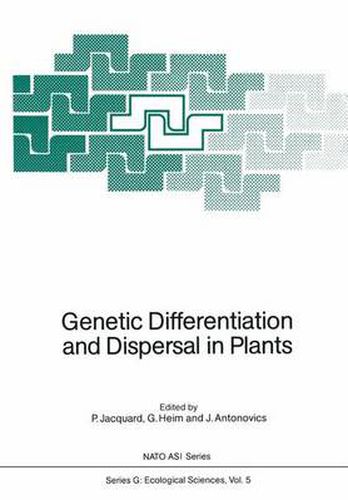Readings Newsletter
Become a Readings Member to make your shopping experience even easier.
Sign in or sign up for free!
You’re not far away from qualifying for FREE standard shipping within Australia
You’ve qualified for FREE standard shipping within Australia
The cart is loading…






This title is printed to order. This book may have been self-published. If so, we cannot guarantee the quality of the content. In the main most books will have gone through the editing process however some may not. We therefore suggest that you be aware of this before ordering this book. If in doubt check either the author or publisher’s details as we are unable to accept any returns unless they are faulty. Please contact us if you have any questions.
This volume is based on a workshop on Population Biology of. Plants The Interfaces (Genetics, Physiology, Demography, Biogeography) , with a specific profile on Diversification of Plant Populations in relation to Modes of Reproduction and Dispersal Genetic and Physiological Mechanisms , held in Port-Camargue, France, from May 21-25, 1984. This workshop was initiated by the Unit of Population and Community Biology , in Montpellier, and sponsored by the NATO Scientific Affairs Division (ARW grant 876/83) and by the CNRS (Table ronde). All populations are subjected to environmental screening . Given a genetic diversity whose expression can be modified by a degree of demographic and individual plastici ty (at the morphological and physiological levels), they present a structure related to their environment. Ideally populations should be studied simultaneously from the point of view of the population geneticist, the physiologist and the demographer . These specific approaches only become fully meaning full in the light of Evolution . Among the evolutionary forces that quantitatively act on the frequencies, objects of interest of workers specialising in Population Biology are selection and drift. An other main object of the study must be dispersal. But, its playing extent - relative to the other forces - in the adjustment to the environment is not fully recognized.
$9.00 standard shipping within Australia
FREE standard shipping within Australia for orders over $100.00
Express & International shipping calculated at checkout
This title is printed to order. This book may have been self-published. If so, we cannot guarantee the quality of the content. In the main most books will have gone through the editing process however some may not. We therefore suggest that you be aware of this before ordering this book. If in doubt check either the author or publisher’s details as we are unable to accept any returns unless they are faulty. Please contact us if you have any questions.
This volume is based on a workshop on Population Biology of. Plants The Interfaces (Genetics, Physiology, Demography, Biogeography) , with a specific profile on Diversification of Plant Populations in relation to Modes of Reproduction and Dispersal Genetic and Physiological Mechanisms , held in Port-Camargue, France, from May 21-25, 1984. This workshop was initiated by the Unit of Population and Community Biology , in Montpellier, and sponsored by the NATO Scientific Affairs Division (ARW grant 876/83) and by the CNRS (Table ronde). All populations are subjected to environmental screening . Given a genetic diversity whose expression can be modified by a degree of demographic and individual plastici ty (at the morphological and physiological levels), they present a structure related to their environment. Ideally populations should be studied simultaneously from the point of view of the population geneticist, the physiologist and the demographer . These specific approaches only become fully meaning full in the light of Evolution . Among the evolutionary forces that quantitatively act on the frequencies, objects of interest of workers specialising in Population Biology are selection and drift. An other main object of the study must be dispersal. But, its playing extent - relative to the other forces - in the adjustment to the environment is not fully recognized.